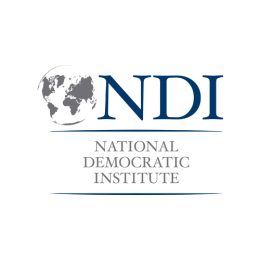The National Democratic Institute is a nonprofit, nonpartisan, nongovernmental organization working to support and strengthen democratic institutions worldwide through citizen participation, openness and accountability in government. Since its founding in 1983, NDI has worked with local partners in 130 countries and territories, bringing together individuals and groups to share ideas, knowledge, experiences and expertise. Partners receive broad exposure to best practices in international democratic development that can be adapted to the needs of their own countries. NDI’s multinational approach reinforces the message that while there is no single democratic model, certain core principles are shared by all democracies. The Institute’s work upholds the principles enshrined in the Universal Declaration of Human Rights. It also promotes the development of institutionalized channels of communications among citizens, political institutions and elected officials, and strengthens their ability to improve the quality of life for all citizens.
Visit Website
National Democratic Institute
HQ Country
United States
Office locations
Albania, Algeria, Armenia, Azerbaijan, Bangladesh, Belarus, Bosnia and Herzegovina, Bulgaria, Burkina Faso, Cambodia, Colombia, Croatia, Cuba, Czechia, DR Congo, Ecuador, Egypt, Ethiopia, Georgia, Ghana, Guatemala, Guinea, Haiti, Honduras, Hungary, Indonesia, Iran, Iraq, Ivory Coast, Jordan, Kenya, Kosovo, Kyrgyzstan, Liberia, Libya, Mali, Mauritania, Mexico, Moldova, Montenegro, Mozambique, Myanmar, Nepal, Nicaragua, Niger, Nigeria, North Korea, North Macedonia, Pakistan, Poland, Romania, Russia, Saudi Arabia, Senegal, Serbia, Sierra Leone, Slovakia, Somalia, South Africa, South Sudan, Sri Lanka, Sudan, Syria, Taiwan, Tanzania, Thailand, Tunisia, Turkey, Uganda, Ukraine, Venezuela, Yemen, Zambia, Zimbabwe
Where they work
Global
Modality of engagement
Advocacy and agenda setting, Capacity building, Convening of dialogues, Research/analysis/knowledge production
Thematic area
Citizen participation, Civil society strengthening, Democracy assistance, Human rights, Local democracy, Social movements/collective action, Transparency & open government
